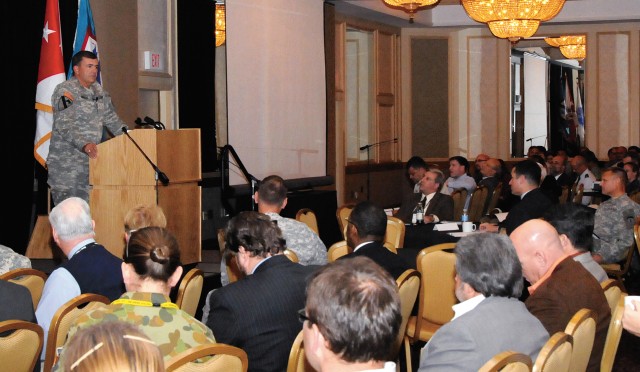FORT LEAVENWORTH, Kan. (Oct. 20, 2010) - Knowledge-management tools are helping warriors with traumatic brain injury, Army Vice Chief of Staff Gen. Peter Chiarelli told nearly 500 at a conference Tuesday in Kansas City, Mo.
Chiarelli spoke to military and private-sector professionals gathered at Fort Leavenworth this week for the 6th Annual Army Operational Knowledge Management Conference sponsored by the U.S. Army Combined Arms Center.
"The one thing that's working in the treatment of TBI is in the knowledge-management area," Chiarelli said. "It's the idea of tying people together who have PTS (post traumatic stress) or TBI with those folks who check in on them every day. And they check in with them each morning using KM tools - something as simple as a smart phone and checklist where they can ask that person to rate on a simple scale how their day is going, and then they can take the appropriate action."
The theme for this year's conference is "Knowledge Management in Support of Full Spectrum Operations," which highlights the impact KM has on operations in Iraq and Afghanistan.
"When I took the job as vice chief of staff of the Army in August 2008, the number of Soldiers in our Wounded Warrior program with a service-disqualifying injury of 30 percent or greater suffering from post-traumatic stress or traumatic brain injury was 38 percent," Chiarelli said in his address to the conference. "In just two years, that number has grown to 63 percent - 46 percent for PTS and 17 percent for TBI. Overall, in the past seven years, in excess of 60,000 Soldiers have been diagnosed with some measure of TBI.
Chiarelli said that websites like CompanyCommand.army.mil and PlatoonLeader.army.mil have provided valuable forums for leaders to share and discuss their experiences, best practices and lessons learned with others, thereby helping one another to lead more effectively.
"By employing knowledge managing concepts and principles, we will be able to share efforts with the civilian medical community, other government agencies and organizations to more quickly develop methods to identify and treat these conditions," he said.
"The knowledge management community has a vital role to play in the continued success of our Army," Chiarelli said. "The capabilities you are designing and fielding will help our leaders to learn faster, understand better and adapt more rapidly."
Related Links:
Army Health Promotion, Risk Reduction and Suicide Prevention Report




Social Sharing